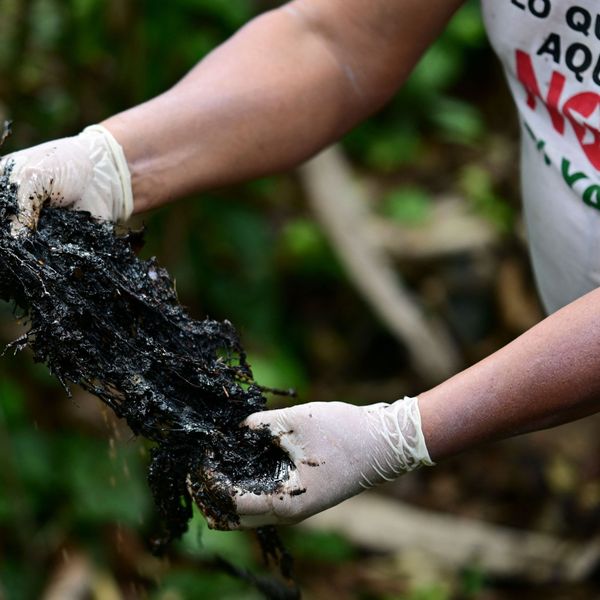BANGKOK - An environmental group is warning U.S. energy giant Chevron to clean up its act in Burma or face legal proceedings where the multinational's links to gross human rights violations in the military-ruled country could be exposed.
There has been little relief for villagers living in the Yadana pipeline region in southern Burma since the Chevron Corporation became a partner to this natural gas venture in 2005, states the Washington D.C.-based EarthRights International (EI) in a report released here Tuesday.
''Chevron and its consortium partners continue to rely on the Burmese army for pipeline security and those forces continue to conscript thousands of villagers for forced labour, and to commit torture, rape, murder and other serious abuses in the course of their operations,'' revealed the 76-page report, 'The Human Cost of Energy'.
Chevron should act on ''its moral and legal obligations to human rights rather than profit from human rights abuses,'' the report added of this project that earned the Burma's junta about 1.1 billion US dollars in 2006, over half of its total earnings from the sale of gas to neighbouring Thailand, which was 2.16 billion dollars that year.
''Chevron can be sued by villagers from Burma if it does not stop the human rights violations,'' Naing Htoo, EI's Burma Project coordinator, said during a press conference at the launch of the report. ''The violations are happening every day.''
''Chevron is aiding and abetting the pattern of abuse that is going on,'' added Katie Redford, U.S. director of EI. ''Chevron is liable for the forced labour. They are liable for the torture and rape the (Burmese) security forces are committing in the furtherance of the contract.''
EI's report comes at a time when Chevron has been trying to give itself a positive twist as a responsible corporate citizen, committed to helping the world achieve its energy needs in a cleaner manner. This slick campaign on television and in newspapers was launched last September in the U.S. One report put Chevron's ''green marketing campaign'' at 15 million dollars.
In addition, Chevron has been trying to distance itself from the reports of human rights violations in the pipeline region of Burma, which the junta has renamed Myanmar, says Redford. ''Regardless of the slick marketing campaigns, if you have a contract with the Burmese junta, you are its business partner. They cannot try to distance themselves from the accusations, which they are doing.''
Total, Chevron's French partner in the Yadana project, is facing similar criticism, but it has opted to admit to some of the accusations reported in southern Burma. ''Total has noted on its website that forced labour is going on,'' Joelle Brohier, editor of a French website on corporate social responsibility in developing countries, told IPS. ''They have learnt from past criticism that they need to provide some transparency.''
But France's only extractive company involved in natural gas projects cannot side-step reports of human rights abuse, she added. ''It cannot ignore these kinds of reports. It has to try and offer answers to deal with these problems that are still going on.''
The main abusers are the Burmese military battalions assigned to protect the pipeline,'' Naing Htoo said in an interview. ''The soldiers confiscate the lands owned by the villagers and force them to grow rice. They also force the villagers to carry military supplies for the camp and have other forms of forced labour. Then there is rape and torture.''
Two battalions, the light infantry battalion 282 and 273, have been given the duty ''to handle security for the pipeline,'' he revealed. Each of these military units has a strength of 300 soldiers. But in all, 14 battalions operate in the area, making it one of the more heavily militarised parts of the South-east Asian country.
The Yadana pipeline has been dogged by controversy since its inception in 1991. This venture, to extract offshore natural gas in the Andaman Sea and have it flow along an overland pipe to Thailand, was backed by a consortium that included the U.S. company Unocal, French company Total and a subsidiary of Thailand's state-owned gas and oil company. The local partner was the Myanmar Gas and Oil Enterprise, an affiliate of Burma's energy ministry.
The mounting human rights violations at the time was documented by EI, resulting in the latter's first report, 'Total Denial', in 1996. Subsequently, several victims of the Yadana project, assisted by EI and a team of lawyers, filed a lawsuit in an U.S. federal court against Unocal, accusing it of ''complicity in their injuries.''
Nine years later, in March 2005, the Burmese victims emerged victorious, when Unocal decided to settle this lengthy legal battle and compensate the villagers. Shortly thereafter, Chevron bought Unocal's stake in the Yadana pipeline.
That legal outcome was a major milestone in international human rights law. ''The case came to be the big test case in terms of corporate responsibility, because till then there was uncertainty over how the courts will handle cases of companies linked to human rights violations in a foreign country,'' says Doug Sanders, a retired Canadian law professor who is on the visiting faculty at Bangkok's Chulalongkorn University. ''Traditionally, international human right law applied to only countries and not individuals or companies.''
That result has ''opened the way for big companies who fail to meet their corporate social responsibilities in foreign countries to feel the heat in court,'' Sanders said in an interview. ''It affirmed that corporations have to bear certain responsibilities under human rights law that can be enforced in local courts.''
The legal victory in the Unocal case was not lost on Redford this week. ''We have done it before, even if it took us nearly 10 years,'' she said of the potential lawsuit against Chevron.
(c) 2008 Inter Press Service


